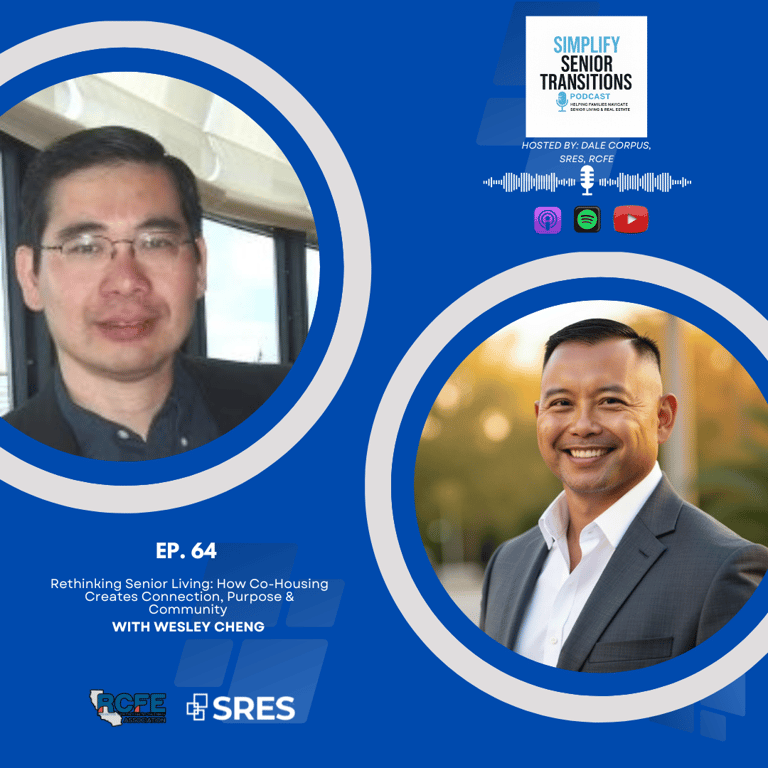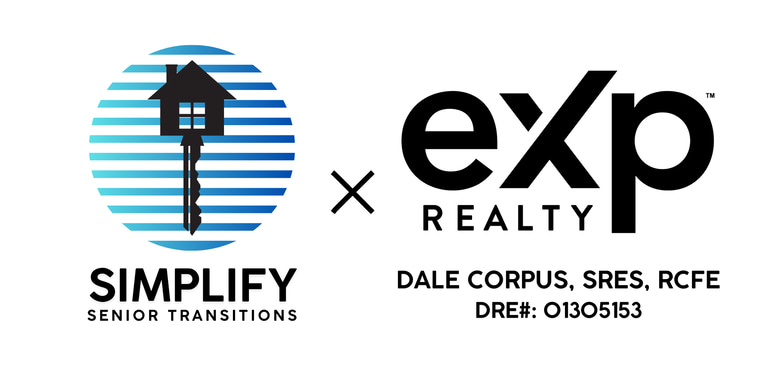Beyond the "Old Folks Home": How Co-Housing Is Redefining Senior Living in the Bay Area
Why intentional communities are offering seniors connection, purpose, and a fresh alternative to traditional care
Dale Corpus
9/12/20254 min read
Beyond the "Old Folks Home": Exploring Co-Housing as a Fresh Path for Senior Living in the Bay Area
As adult children, navigating the myriad options for our aging parents can feel like a full-time job — often on top of our existing responsibilities. The "sandwich generation" struggle is real, especially here in the San Francisco Bay Area, where choices can be overwhelming and the market challenging. From downsizing homes and managing emotional stress to finding suitable care options, it's a lot to take on.
That’s why the Simplify Senior Transitions Podcast is here to bring you practical tools and expert insights to make these transitions easier. In a recent episode, our host, Dale Corpus — a senior transition specialist and real estate expert who understands the sandwich generation juggle firsthand — chatted with Wesley Cheng, a true innovator in the senior living space.
Wesley is the founder of the Silicon Valley Senior Roundtable, executive director of Televisit.org, and COO of Stack Care. His journey into senior living innovation is deeply personal; it started 20 years ago when his mother developed Alzheimer’s, inspiring him to find better ways for people to age with dignity and support. This led him to explore co-housing, a concept that offers a hopeful alternative to traditional senior care.
Here’s what you’ll learn in this episode:
What Co-Housing Is: An intentional living arrangement where residents have private homes but share common spaces, meals, and decision-making — essentially creating a "chosen family."
A Solution for Loneliness: How co-housing effectively combats isolation and loneliness by fostering healthy aging habits and mutual accountability among residents.
Beyond Traditional Senior Living: Why co-housing is distinctly different from assisted living or retirement communities, focusing on intentional living for active seniors aiming to stay healthy for as long as possible.
Community Governance: The unique legal structure and consensus-based decision-making process that binds co-housing communities together.
Intergenerational Connection: How these communities can foster enriching relationships between different age groups, providing purpose for older adults and support for younger families.
Practicalities and Challenges: Insights into how co-housing communities are funded (resident-led development), why vacancies are rare, and how conflicts are resolved.
Bay Area Landscape: The current state of co-housing development in our local region and steps families can take to explore this option.
Co-Housing: A Different Approach to Senior Living
Imagine your parent not just living in a place, but finding a "chosen family" — a community that offers connection, purpose, and support.
This is the essence of co-housing. Wesley shared a heartwarming example of Mary, who, after losing her husband, discovered co-housing and quickly found herself cooking group dinners, gardening, and mentoring younger residents. Her life transformed from potential loneliness to vibrant community engagement.
One of the most crucial takeaways is that co-housing is NOT assisted living. It’s about intentional living, encouraging healthy habits and social engagement before extensive care is needed. The goal is to stay healthy and connected for as long as possible, making it a true “age in place” solution where residents look out for each other.
While traditional retirement resorts focus on individual pursuits like golf or swimming, co-housing emphasizes the strength of the group, with the tagline: “Life is better together.”
Co-housing is legally structured much like a condo with an HOA, but with a key difference: all residents participate in decision-making by consensus. This shared governance, while sometimes challenging, ultimately builds strong bonds as people learn to work through differences and appreciate each other.
Residents maintain their private homes while enjoying shared amenities like common houses and gardens — balancing individual privacy with communal life.
Navigating the Practicalities and Bay Area Landscape
For many of us, helping parents choose care options and manage the emotional stress of loneliness is paramount. Co-housing directly addresses these by providing a built-in support system and accountability, combating the isolation that often leads to cognitive decline. It also offers intergenerational connections, giving older adults purpose through interaction with younger families — while offering those families support in return.
However, there are practical considerations, especially for families in Contra Costa, Alameda, Santa Clara, San Mateo, San Francisco, Solano, and Napa counties.
Development Costs: Co-housing is a resident-led, multi-million-dollar undertaking that takes years to establish.
Affordability: Units are market rate and often require leveraging equity from an existing home. The good news: they tend to hold value well.
Availability: Vacancies are rare. For example, Mountain View Co-Housing has extremely low turnover because people rarely leave once they move in. Joining a “forming” community is often the most viable path.
Regional Options: The East Bay and Santa Cruz currently have more co-housing opportunities than the Peninsula or San Francisco, though increased governmental support for density may open new possibilities.
Is Co-Housing the Right Fit for Your Family?
Co-housing is ideal for seniors who value community and interdependence over strict independence.
If this unique model resonates with you or your parents, here are some first steps to explore:
🎥 Watch a TED Talk: Wesley highly recommends architect Grace Kim’s TED Talk on co-housing.
🌐 Explore cohousing.org: A nonprofit umbrella for U.S. co-housing communities, offering directories and resources.
👥 Talk to Residents: Co-housing communities are welcoming and happy to share their experiences. Organizing a group tour is a great way to see the “magic” firsthand.
Co-housing is a fresh, hopeful concept that offers connection, choice, and a genuine sense of belonging.
If your loved one is considering senior living and you need to figure out what to do with their home, let’s talk!
📞 Schedule a FREE consultation: www.simplifyseniortransitions.com
📲 Quick question? DM me on Instagram: @soldbydale
And remember — if you found this episode helpful, please leave a five-star review and share it with someone who might benefit!
P.S. Got news or an amazing story to share? Email me at dale.corpus@exprealty.com and you might be featured in our next episode.
Watch The Podcast Here



Transitions Made Simple
Helping seniors transition with ease and peace.
📍 Serving the San Francisco Bay Area
📞 Get in Touch
📬 STAY INFORMED
Dale Corpus, SRES, RCFE
📱 925-380-1657
🕓 Available for free 15 min consultations by appointment
© 2025. All rights reserved.
Sign up for monthly senior transition tips & real estate insights.
